Cindy's Genealogy Project
Arza Parker
"Do not go where the path may lead, go instead where there is no path and leave a trail."
Ralph Waldo Emerson

Arza B. Parker was born sometime in the mid to late 1820's in Michigan, which was located in the newly acquired Northwest Territory. The Great Expansion was well on its way, creating the opportunity for a new beginning for New Englanders and immigrants alike. With the United States population doubling every two decades and a huge increase in immigration after the Napoleonic wars, many families took advantage of the cheap and abundant land that became available past the Appalachian Mountains.
Michigan was slow to entice the pioneers into its territory at first due to the colder temperatures and shortened growing season. Transportation was another issue confronted by the pioneers. There were trails that the Native Americans forged, but they were too crude for the cattle, horses and wagons to travel on. The Erie Canal was completed in 1825 which allowed for passengers and produce to have greater access to the East Coast. The newly invented steamships covered longer distances with greater speed but they were considered unsafe due to the boiler explosions that commonly occurred.
Isolation, clearing land for farming and crop uncertainty made frontier life very difficult. The families worked from sunrise to sunset with very little time for anything else. The typical household was crude with very little in the way of comfort. They did not have running water, so bathing was a scarce adventure. The tallow that they used for lamps and smoke from the fireplace made the inside of the cabin smelly and sooty. Cold winter drafts chilled through the bone during winters. Clothes were homespun wool that was heavy and uncomfortable. With hard work and some sacrifices, the pioneering families were willing to persevere all of these hardships in order to own their own land. They were no longer required to work for little wages for someone else.
Many farmers took advantage of the cheap prices of land and usually purchased more than they could cultivate in hopes to resell the land at a higher price to newly arriving immigrants. Often, the farmers would over farm the land to the point of poor crop production, in which case they would simply sell the land to newcomers and relocate to more fertile lands. This could have been the case for Arza when he set out on his own and turned up in southern Wisconsin in the mid 1800's. I do not show any records of land ownership for Arza, so I will assume that he hired on to a farmer to earn a living until he could save up enough money to purchase his own farm.
Before I continue the tale of Arza, I need to take time and discuss his future wife Harriet, daughter of James J. Hill. Harriet was born in England on April 13, 1826. She immigrated to the United States in 1846 when she was 20 years old. She was married to Mr. A. Cooper before immigrating to the United States. Mr. & Mrs. Cooper had three children, Joseph, Thomas, and Mary Jane, before Harriet met and married Arza Parker.
When Arza and Harriet married in late 1850's the children used Cooper as their middle name and picked up the Parker surname, thus going by the names Joseph Cooper Parker, Thomas Cooper Parker and Mary Jane Cooper Parker.
I came to this conclusion due to Harriet's three oldest children Joseph, Thomas and Mary Jane who were often referred to as stepsiblings/half-siblings in several documents pertaining to the Parker family. The strongest evidence that I have of the Cooper relationship is the 1925 Iowa census where Mrs. Mary Jane Sharp answered the questions of her paternity.
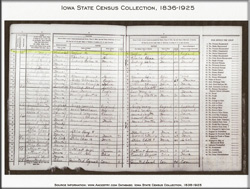
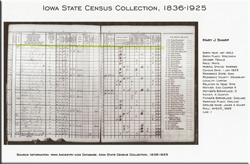
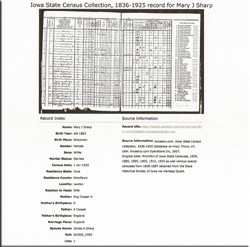
The earliest record that I could find linking Arza and Harriet together is the 1860's Federal Census. They were living in Union, Rock County, Wisconsin which is located on the Wisconsin/Illinois border. Arza was a farmer on a small parcel of land. They had three children living with them at the time, Joseph (9), Thomas (6), and Mary Jane. (3). During this time, Lincoln was being sworn in as our 16th president and the Civil War was brewing. I have not found any records so far indicating Arza participated in the war.
Life went on in the Parker household with Harriet giving birth to Sophia in 1861, Melissa in 1866, and Amon in 1868. The Parker's stayed on their farm for several years until sometime in the later part of the decade they decided to pack it all up and move to Plymouth County, Iowa. Joseph and Thomas decided to part ways with the family to make their own way in the world.
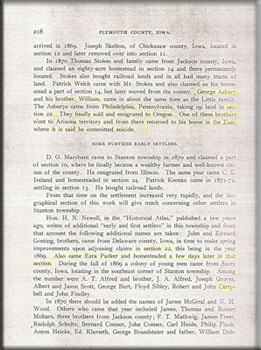 Stanton Township, Plymouth County, Iowa is located near Sioux City, Iowa.
It was a brand new farming community when Arza and Harriet arrived. Arza was able to save up enough money to purchase eighty acres of farmland and he worked hard to build the family home. Around 1872, forty-six year old Harriet gave birth to Alice, the last of her seven children. What I found interesting during this time is Arza, for some unknown reason, switched the land deed into Harriet's name in 1878. That means that Harriet became the sole owner of the farm. It was not common for women to own any kind of property during this time period.
Stanton Township, Plymouth County, Iowa is located near Sioux City, Iowa.
It was a brand new farming community when Arza and Harriet arrived. Arza was able to save up enough money to purchase eighty acres of farmland and he worked hard to build the family home. Around 1872, forty-six year old Harriet gave birth to Alice, the last of her seven children. What I found interesting during this time is Arza, for some unknown reason, switched the land deed into Harriet's name in 1878. That means that Harriet became the sole owner of the farm. It was not common for women to own any kind of property during this time period.
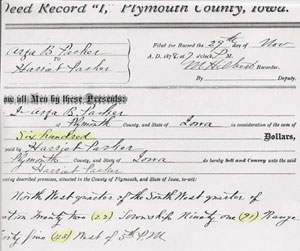
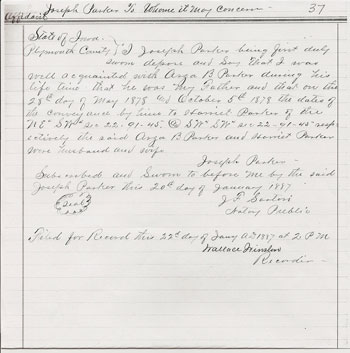
Well, everything appears to indicate the Parker's led a quiet, ordinary, hardworking life on the farm until that fateful Halloween night in 1885. After his death, Arza was buried somewhere nearby the farm in a church cemetery. I find it odd that no one stepped forward to purchase a headstone for Arza. He is buried in a forgotten cemetery in an unmarked grave somewhere among the cornfields of western Iowa. It does not seem (to me, anyway) that anyone really cared about his death.
Harriet, on the other hand, seemed to have been well taken care of by her children. She sold her farm not long after the trial. Joseph came back into town to help her settle her affairs in the spring of 1886. She and Alice moved to Woodbury County, Iowa to stay with or near her children. She lived with her unmarried son, Amon around the turn of the century until 1910 when they moved in with Alice and her husband in Chicago. Later that same year, Harriet and Amon moved to Chesterton, Porter County, Indiana to live close to Thomas and his family. Harriet lived her remaining days in Chesterton until her death on January 8, 1918; she was 92 years old. She is buried in Chesterton Cemetery in Chesterton, Indiana.
Harriet's Obituary could be found in the Chesterton Tribune on January 10, 1918, page7 and it reads:
Harriet C. Parker
Grandma Parker, (Mrs. Harriet) died at the home of her son, Amon in Waverly, Wednesday morning, January 9th at 1 o'clock after an illness of about two weeks, aged 91 years, 6 months, and 26 days. The funeral will be held Saturday. Services will be held at the home at 1 o'clock p.m. and at the Porter Congregational church at 2 o'clock. Internment in Chesterton cemetery. Deceased was born April 13,1826 , in Liverpool, England, and was married to Arza Parker in England. With her husband she came to America 72 years ago and settled in Baraboo, Wisconsin. Seven Children were born to this couple, six of whom survive, they being Joseph C., of Minnesota; Tom Parker, Crisman; Mrs. Mary Sharp, Lawton, Iowa; Mrs. Melissa Enault, and Mrs. Alice Bray of Chicago, and Amon Parker, of this place. Besides these, she leaves 29 grandchildren and 31 great-grandchildren. She is mourned by all who knew her.
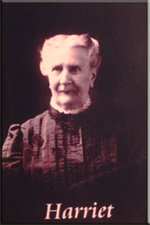
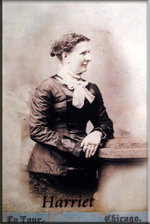
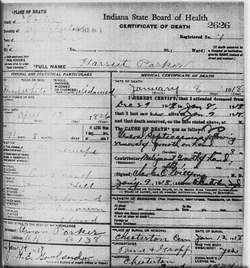
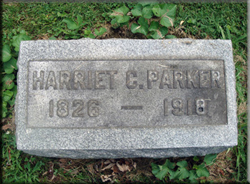
 Back to Top.
Back to Top.
A Dastarly Murder!
"When the night is dark and scary,
and the moon is full and creatures are a flying and the wind goes Whoooooooooo,
you better mind your parents and your teachers fond and dear,
and cherish them that loves ya, and dry the orphans tears
and help the poor and needy ones that cluster all about,
OR THE GOBLINS WILL GET YA IF YA DON’T WATCH OUT!!!"
Little Orphan Annie by James Whitcome Riley
October 31, 1885
ALL HALLOW'S EVE
It was late fall in 1885 when the harvest was completed and all the farmers in the midwest were settling in for the long approaching winter. Such was the case on a little country farm in the quiet township of Stanton in Plymouth County, Iowa. Farmer Arza Parker had just settled in his bed with his wife Harriett after a long day of tending to the typical farming chores. Little did anyone realize that that night would end-up being the beginning of the end for Harriett and, well, just the end for Arza…
NOVEMBER 5 1885
PLYMOUTH COUNTY, IOWA
THE DAILY SENTINNEL
A DASTARDLY MURDER
One of the most dastardly murders that ever occurred in Plymouth County was perpetrated in Saturday night in Stanton Township, about eight miles south of this city, the victim being an old farmer sixty years of age, named Arza Parker. The first report of the homicide reached this city Sunday morning through a messenger who came in to notify Coroner Myers of the killing and request his presence. Mr. Myers at once responded, and in company with Dr. Ensminger drove out to the home of the murdered man. An emissary of the Sentinel was promptly upon the
SCENE OF THE MURDER,
And gained the following facts:
Saturday night about 10 o’clock, after Mr. And Mrs. Parker had retired for the night and the daughter was sitting up doing some sewing, the latter heard a strange noise at the barn and immediately woke her father, informing him of the fact. The old gentleman hastily dressed himself and taking the lantern, which the daughter had lighted, proceeded to the barn only a few rods distant, and from which he never returned alive, his body being found next morning about thirty feet from his own doorstep, the skull badly crushed and his face and person covered with blood.
EVIDENCES OF A STRUGGLE
The appearances about the premises would indicate that as the old man approached the barn door he was met by some one who assaulted him with a pitchfork, as broken pieces of that implement were found near by and the ground was badly torn up, giving evidence that the old gentleman had desperately resisted the assault but he was most likely dazed by the first blow, and fell an easy victim to the determined assassin. The remains of Parker showed that several heavy blows had been inflicted beside a deep gash near the temple made by one of the prongs of the bloody and broken fork. After the murderer had accomplished his purpose and left his victim for dead, the latter partially recovered and tried to reach the house, a bloody trail marking his course from the scene of the tragedy to where he finally fell exhausted and died, only a few steps from the door of his home.
THE DAUGHTER’S STATEMENT
The daughter, a young girl about fourteen years of age, informed the Sentinel reporter that after her father went to the barn she heard nothing further of him, and in about half an hour got into bed with her mother. Shortly afterward she and her mother became frightened, got up and went to Mr. Jenson’s, a neighbor living about thirty rods distant, leaving alone in the house a little 6-year old grandson. This was about 1 o’clock at night. They remained at Jenson’s a short time, then returned home and retired, not looking to see what had become of the old gentleman nor visiting the vicinity of the stable. Sunday morning they again went to Mr. Jenson’s, and then for the first time told him that the husband and father was missing. On returning home in company with the neighbors, they saw the body of Parker lying only a few feet from the house, where he had expired and they remarked, "There he is." The
WIFE OF THE MURDERED MAN
Gave about the same account of the occurrences of the night. When asked if she and her husband did not have frequent and stormy quarrels, she replied in the negative, though admitted that they had had trouble in the past. She is a large, sinewy woman with a determined look, and of foreign birth. Her husband, we learn, was born in Cheshire England.
THE INQUEST
Coroner Myers summoned the following gentlemen of that vicinity to serve as jurors: John Tripp, W.E. Gosting and John Schroder. After viewing the remains the jury took part of the testimony of Mrs. Parker and daughter, then adjourned to meet at the coroner’s office in this city Wednesday, when the investigation will be continued.
The reporter was unable to learn of any person or persons that held any malice against Parker or that would be likely to desire his death, and there is nothing to show that the murder was committed for money. There are many conjectures and surmises as to the guilty party, but as the inquest will probably develop, all the facts, the public should patiently await the verdict and not pass hasty judgment.
THE FUNERAL
The remains of Parker were interred to-day at 1 o’clock, the funeral taking place from the German church near his late home.
LEMARS SEMI WEEKLY SENTINEL
November 13, 1885
We understand that the coroner’s jury in the Ezra Parker case have returned a sealed verdict, which will not be made public until certain arrests are made.
LEMARS SEMI WEEKLY SENTINEL
November 20, 1885
Wild RumorsJ.C. Parker, step so of the lat Ezra Parker, was a caller at the Sentinel office this week. He was in Chicago at the time of the murder and was notified of the same by a telegram sent by his mother requesting that he come to her at once. This he did. The circumstances connected with the murder, as published in the Sentinel at the time, were in the main correct. The son however, believes his mother innocent of the crime. He explains the actions of mother and daughter on the night of the homicide, by stating that his step-father was very eccentric, and it was not an uncommon thing for him to go out of the house at night and remain away for several hours, sometimes days. Mr. Parker says there is no truth in the report that any of the family have tried to run away, though he admitted that the old lady attempted to take her own life. Ever since the murder the daughter is very timid and can hardly be induced to go out of doors after dark. A rumor was started the forepart of the week to the effect that Mrs. Parker had made a confession of being the guilty party, and several have called at this office inquiring about the matter. So far as the Sentinel has been able to learn there has been no confessions, neither has the coroner’s jury returned a public verdict.
The step-son says it is his purpose here to settle matters of a financial nature, and take his mother and sisters back with him to Chicago.
LEMARS SEMI WEEKLY SENTINEL
November 24, 1885
The son and two daughters of Mrs. Ezra Parker, who come here from Chicago shortly after the murder of their step-father, returned to Chicago on Friday’s train.
LE MARS SEMI-WEEKLY SENTINEL
Le Mars, Iowa, Friday, December 4, 1885
THE PARKER MURDER
Mrs. Harriett and Miss Alice - Wife and Daughter of Arza Parker - Arrested and Charged With the Murder.
Though but little has been said concerning the Parker murder which occurred some weeks ago, the SENTINEL has all along been aware that the case was being quietly worked up by one of Pinkerton’s detective force, who came here in the interests of the county about one week after the homicide. The detective has repeatedly visited the Parker homestead, talked with Mrs. Parker and daughter, and the neighbors, and from them gained very conclusive evidence-at least sufficient to warrant the arrest of the accused parties, who have been suspicion from the first as the perpetrators of this fearful crime, and which was so intimated in the SENTINEL account at the time.
Below we give the coroner’s verdict which has been kept secret till the arrests were made:
CORONER'S VERDICT
State of Iowa, Plymouth Co.-ss.
An inquisition holden at LeMars in Plymouth county, Iowa, on the 1st day of November, 1885, before F.N.Myers, coroner of said county, upon the body of Arza Parker then lying dead, by the jurors whose names are hereto subscribed. The said jurors upon their oath do say that the said Arza Parker came to his death by being pounded over the head with a pitchfork handle and also being stabbed in the head by the prongs of a pitchfork until dead, said for was used in hands of a party unknown to the jury. The jury feels satisfied after hearing all the evidence in the case that Harriett Parker, wife of the said Arza Parker and Alice Parker, daughter of said Arza Parker are implicated in the murder of the said Arza Parker and would also advise the arrest of the said Harriett and Alice Parker as soon as the coroner sees fit.
CHARLES TRIPP,
W.E. GOSTING.
HANRY SCHROOTER.
Coroner Myers Wednesday filed the proper information, carefully drawn up by Curtis & Durley, based upon the facts set forth in the above verdict, and warrants for the arrest of Mrs. Parker and daughter were placed in the hands of Sheriff Haerling, who departed for the country early this morning to make the arrests. The accused parties will be brought to this city and lodged in jail.
(From Thursdays Daily, December 8.)
The arrest of Mrs. Parker and daughter occurred yesterday afternoon, the warrants being served by Deputy Sheriff Fuller, On going to the country he learned that the Parker family were moving to the home of Mrs. Parker’s daughter, near the West Forks of the Little Sioux river in Woodbury county, and here the officers found and arrested Mrs. Parker. Returning to the old Parker homestead, Mr. Fuller found the daughter, Alice, and arrested her, bringing both of the prisoners to the city and lodging them in jail. When arrested neither of the prisoners evidenced any surprise. They took the matter rather coolly and calmly, and rather as if they expected it.
This morning the SENTINEL reporter called upon
THE PRISONERS IN JAIL.
They were confined in separate cells, and Alice looked as if she had passed a very restless night, her eyes being red and inflamed from weeping. She is about fifteen years of age, of spare build, and not bad looking, and her appearance impresses on rather favorable. She does not seem to fully comprehend the serious nature of the charge resting against her, and though nervous from weeping, talked calmly and to all appearances frankly about the murder. She claims to know nothing as to who is the guilty party, and from her no new facts connected with the case were learned.
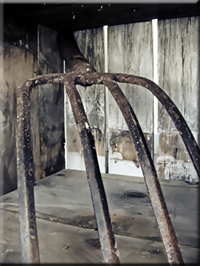
Mrs. Parker takes matters less to heart, apparently, than the daughter. She looked as if the night in jail has passed without particular discomfiture. She is quite an elderly English woman of large frame, jet black hair, dark complexion, and rather coarse features. She remarked to the sheriff on the way to the city that if she could have Alice with her she would about as soon pass the winter in jail as in the old house on her farm. To the reporter Mrs. Parker said that she had no idea who murdered her husband, and she did not think that he had any more or worse enemies that men usually have. She thought that she was more interested in having the mystery cleared up than any one else. When asked if she had employed counsel, she said no; that she had no money; that the money derived from the sale of hogs had gone to pay debts, and that there was a mortgage on the farm, and she had not means to employ attorneys, and would have to submit to whatever fate was in store for her. She spoke without apparent nervousness or much feeling, and the impressions left that through ignorance of the law she does not comprehend the grave nature of the situation.
The evidence against these prisoners implicating them with the murder, so far as we have been able to learn, is purely of a circumstantial nature.
This morning Mrs. Parker was brought before Justice Alline for examination, but not being prepared, the matter was deferred till afternoon, and at that time the preliminary hearing was postponed for two weeks at the request of the defense, who has retained as Messrs. Argo, Kelley & Augir. The prosecution will be conducted by Messrs. Curtis & Durley.
LE MARS SEMI-WEEKLY SENTINEL
December 8, 1885
Mrs. Parker and her daughter, Alice, are inclined to talk but very little since being incarcerated. And while they may not be, and probably are not, the principals in the late homicide, it is believed that they know more about it than they are willing to tell, and very wisely they keep closed lips.
LEMARS SEMI WEEKLY SENTINEL
December 20, 1885
The Parker murder case came up this morning and brought with it a great surprise to the public. Motion was at once made for a change of venue to Jake Rubles court and sustained by the necessary affidavits that justice could not be had in the mayor’s or other justice’s court in LeMars. Messrs. Curtis & Durley, attorneys for the prosecution then found that one of the Elgin townships justices had resigned and that the township board had appointed Ruble and that Argo had his favorite court established again and ready for business. The prosecution did not care to put the county to the expense of a trial before a court that had once, in its own language adjourned for an hour to take a drink and so dismissed the case without prejudice. We want to attract the attention of the people to this Elgin township scheme so that it may be kept steadily in view at each election.
So there you have it, the murder case was dropped by the prosecution due to political reasons. I am still wrapping my brain around this situation. It is hard to believe that a violent murder took place and the accused just walked away because the prosecution chose to save the taxpayers some money. Talk about getting away with murder.
Anyway, I know many of you are wondering who are these people and how do they fit into our family tree. Arza and Harriet are my great, great grandparents. Well, at least Harriet is...
 Back to Top.
Back to Top.
Contact Us | Copyright
Total number of visitors:
Copyright © 2026 HoosierDaddyGenealogy.com.
Design by FreeWebTemplates.me.


